Medically review by Kim Langdon


All right, all right. We're not here to play diet dictator and tell you these foods are 100% off-limits.
Sometimes, swearing off foods and deeming them good vs. evil can be pretty negative, actually.
We simply want to stress the fact that labels can be deceiving. If you're just getting into eating healthy, food can seem pretty overwhelming to navigate.
If you need an extra hand, consider our 7 Day Make Ahead Meal Plan.
The truth is that it is.
Marketing techniques and high demand for healthier snacks, treats and convenience foods mean we're likely to make some generous assumptions.
So, we're gathering up some expert opinions on foods that seem healthy, but just don't stack up. These are the ones you might want to avoid.
Reduced-fat peanut butter
Hopefully, this one is a no-brainer. Whether or not you're spreading on peanut butter, almond butter, cashew butter or sun butter, there's one thing that creamy stuff should be: chock full of healthy fats.
That's where the nutrition lies, after all.
Fat reduction in commercial products, especially ones that are supposed to be fatty, can only mean one thing - more sugar, with a dose of chemicals and preservatives.
Don't be fooled by low-fat products, especially when it makes just about zero sense like with nut butters.
Whatever nut butter choice you make, it should have one or two ingredients, the second being salt.
Vegetable crisps
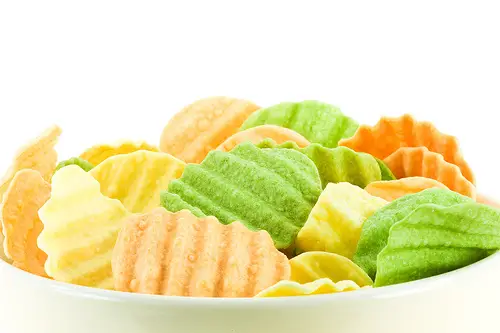

It's no secret that potato chips aren't exactly health food.
They're empty calories, and they're often considered a food without brakes.
Once you pop, the fun doesn't stop (until the bag is empty).
While there's nothing inherently wrong with clean ingredients such as roots, some olive or coconut oil, and a pinch of sea salt, choosing sweet potato chips or beet chips over regular spuds isn't doing you a favor.
Opt for fresh vegetables instead or make your own chips at home to avoid overindulgence.
Besides, most brands you'll find in the store use refined oils and the main ingredient?
Well, potatoes! Oftentimes, a bag of "veggie crisps" is just potatoes disguised by different colors.
Granola
This is one of those foods that is most often labeled with a "low-fat" or "gluten-free" tag making the consumer not think twice about grabbing a box.
When it's in the pantry, granola has the potential to be breakfast every weekday morning.
So, what's the issue? Well, most granola is doused in sugar. A cup of the stuff will run you up to 600 calories and 25-30 grams of sugar.
Yikes! Whether or not it's natural sweetener like rice syrup, it's still adding up.
The serving size is often meager without much protein leaving you hungrier than before, far before lunchtime.
Making your own granola at home where you control the ingredients and using it in moderation is your best bet.
Margarine
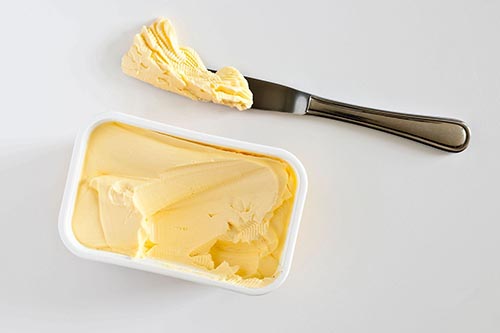

It's clear that we are no longer afraid of fat. Society is now accepting the fact that getting back to our roots when it comes to this "forbidden" macronutrient is important and beneficial to our health.
So, that means margarine is out until 2020 when the FDA will require margarine to contain no trans fat.
This "healthier-for-you" butter alternative is a nutrition nightmare sworn off by many dietitians, mostly due to its likelihood to contain trans-fats... you know, the stuff that even fast-food restaurants are doing away with.
That's how you know it's bad!
Opt for coconut oil, red palm oil, or grass-fed butter instead as they don't contain trans fats and are healthy to cook with.
Fruity yogurts
Here's where you ought to read your labels. Yogurt brands love advertising their low-fat content and low calorie counts right on the front of the package, leading you to believe this is a good choice.
It might read, "real fruit on the bottom," but you should take a closer look.
More often than not, that real fruit is tossed up with a couple of teaspoons of sugar which take away from the nutrition to be garnered from a quality dairy product and fresh fruit.
Instead, opt for full-fat, grass-fed and unsweetened plain yogurt.
Add your own fruit and skip out on sweetener altogether for a protein-packed breakfast side or snack.
Egg white beaters
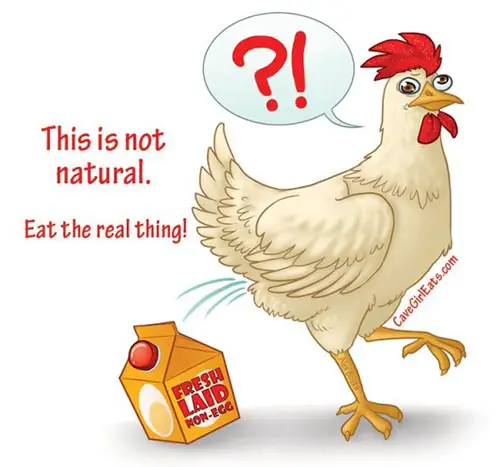

Okay, we've got a few problems with this convenience food. You know the product we're talking about, right?
It comes in a carton much like milk. These egg whites are almost certainly pasteurized and sourced inhumanely from factory farms which lessen the nutrition substantially.
In order to compensate, manufacturers add back nutrients. This is always a bad sign! Besides, eggs on their own are healthy including the yolk.
While egg whites serve their purpose, you can serve yours by separating them manually from free-range, organic eggs. It's not brain surgery; it's a simple cooking task.
Don't be lazy!
Fruit juice
If you're keen on the places sugar is hiding out, you probably already know this one.
The fact is that sugar is sugar. Whether or not it's natural, it flows through your body in the same way.
Juice can have added sugar or ingredients, or it might be labeled as "100% fruit juice."
While from a nutritional standpoint real juice is better than concentrate, it's certainly not adding much to your diet besides a blood sugar rise and fall.
A cup of OJ is like eating a few oranges in one sitting which you wouldn't do, would you?
Forgo fruit juice and sip on low-sugar kombucha or flavored seltzer water instead.
Protein powders
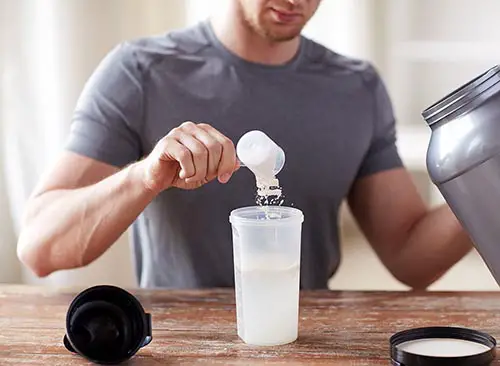

There's a whole lot of buzz about protein and why we need so much of it, but if you're eating an omnivorous diet based around whole foods, you are likely getting enough if not a bit much already.
If you're hitting the gym, you might be tempted by the fitness world to start chugging down whey, but not so fast.
Most protein powders are packed with artificial sweeteners and ingredients you can't even pronounce.
Do some research before you grab your shaker bottle "for the gains." Opt for plain whey if you can tolerate dairy or pea protein with clean ingredients.
If it's sweetened, look for a stevia-sweetened brand.
Your best bet? Eat real food instead. Chicken breast, anyone?
Processed deli meats
Once again, here's an example of a pre-packaged luxury item that our long-term health can do without.
While deli meats are an easy source of fuel, particularly highlighted in the sub or sandwich, they're often comprised of more than one ingredient.
From added sugar during the curing process to sulfites and sulfates to the excessive amounts of sodium, deli meats don't have much going for them.
Fortunately, the market is expanding so avoid "low-fat" claims and opt for "uncured" and organic labels instead which can offer up an easy lunch option.
Processed cheese
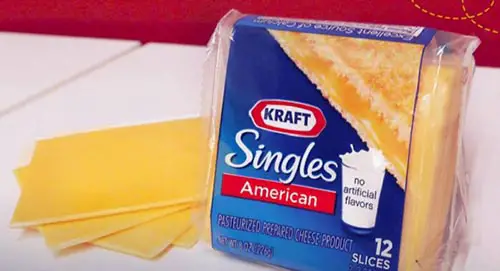

The cat is out of the bag with this one. It's no surprise that Kraft singles are NOT cheese, but merely cheese-like products and it's labeled quite clearly.
They're shaped like cheese and that's about it. Amongst "fake cheeses", the low-fat pre-shredded versions are other culprits.
Opt for fresh, small-batch fermented dairy instead. Don't rob yourself of the nutrition and even more importantly - the flavor - of real cheese.
If you tolerate dairy, you should be getting a healthy dose of probiotics from live cultures and healthy fats, not a slice of artificial flavors and colors.
What foods were you surprised to learn weren't so healthy after all? Spread the word!
This article was fact checked for accuracy by Dr. Kim Langdon, MD. As always, this is not personal medical advice and we recommend that you talk with your doctor.
References
Kimberly Langdon M.D. is a retired University-trained obstetrician/gynecologist with 19-years of clinical experience. She delivered over 2000 babies to mothers in a suburban Midwestern community.
